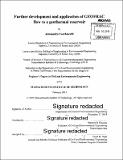Further development and application of GEOFRAC flow to a geothermal reservoir
Author(s)
VecchiarelliI, Alessandra
DownloadFull printable version (22.69Mb)
Other Contributors
Massachusetts Institute of Technology. Department of Civil and Environmental Engineering.
Advisor
Herbert H. Einstein.
Terms of use
Metadata
Show full item recordAbstract
GEOFRAC is a three-dimensional, geology-based, geometric-mechanical, hierarchical, stochastic model of natural rock fracture systems. The main characteristic of GEOFRAC is that is based on statistical input representing fracture patterns in the field in form of the fracture intensity P₃₂ (fracture area per volume) and the best estimate fracture size E(A). Recent developments in GEOFRAC allow the user to calculate the flow in a fractured medium. For this purpose the fractures are modeled as parallel plates and the flow rate can be calculated using the Poisseuille equation. This thesis explores the possibility of the application of GEOFRAC to model a geothermal reservoir. After modeling the fracture flow system of the reservoir, it is possible to obtain the flow rate in production. A parametric study was conducted in order to check the sensitivity of the output of the model and to explain how aperture, width and rotation (orientation distribution) of the fractures influence the resulting flow rate in the production well. A case study is also presented in this thesis in order to confirm the applicability of GEOFRAC to a real case. GEOFRAC is a structured MATLAB code composed of more than 100 functions. Examples on how to obtain P3 2 and E(A) from fracture trace lengths on outcrops are presented in the Appendix 1. A GUI was created in order to make GEOFRAC more accessible to the users. It should also be kept in mind that future improvements are the keys for a powerful tool that will let GEOFRAC to be used to optimize the location of the injection and production well in a geothermal system.
Description
Thesis: Civ. E., Massachusetts Institute of Technology, Department of Civil and Environmental Engineering, 2015. Cataloged from PDF version of thesis. Page 174 blank. Includes bibliographical references (pages 169-173).
Date issued
2015Department
Massachusetts Institute of Technology. Department of Civil and Environmental EngineeringPublisher
Massachusetts Institute of Technology
Keywords
Civil and Environmental Engineering.